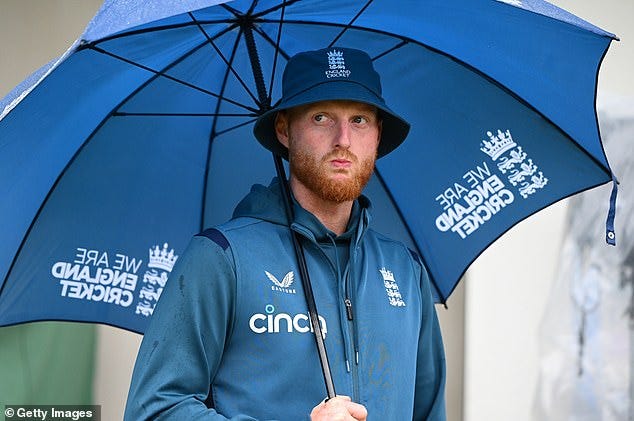It has been a strange series. Australia have played poorly. Their three best batsmen have delivered not very much. Their fabled fast bowlers have struggled. Their vital spin bowler has gone home. England are full of self-congratulation for how they have played, an indulgence rather slavishly copied in the easy press they get. England have certainly talked a good game yet, for all that, that are 2-1 down with one to play and the Ashes have gone.
In his interview with Michael Atherton after the game, Ben Stokes refused to countenance that any decisions he had made might have been wrong. The England camp may not care to reflect but they ought to. We will do it instead, if they won’t.
Something has gone awry so which of England’s decisions have come off and which have gone wrong? It is a difficult question to adduce whether or not a decision has worked. In part we have to judge the decision at the time it was made. With the information then available, was it a rational call? Yet all decisions are also made with consequences in mind- that the player should score runs or take wickets and that the game should be won. There is always a consequential element to the judgment of a decision. So, on that dual basis, how are England doing?
1. Stokes’s declaration in the first Test was a mistake. Surely it has to be counted an error, when Joe Root is more than a hundred not out and scoring freely, to bring the batsmen in. Another 40 runs there, which were not guaranteed but were likely, would have changed the game. Maybe England would have ended up drawing the game. If so, the Ashes would be at stake at The Oval. It’s the classic instance of the arrogance of the current approach, aggression before thought.
2. The batting in the first innings at Lord’s was really poor. England collapsed from 190-1 in a flurry of shots spooning the ball to the boundary. Steve Smith said that they could not believe England fell into such an obvious trap. It was stupid cricket but England wrote it off as just the way they play. Well, if that is just the way they play they are both arrogant and not as good as they think they are.
3. Jonny Bairstow’s selection as wicket-keeper has turned out to be a serious error. Bairstow had not kept wicket in international cricket for 3 years and he was coming back after a serious injury. He is clearly not fit both in the sense of carrying too many pounds and carrying an injury. Bairstow’s keeping in the first two Tests was very poor. He missed an easy stumping and a couple of catches that, in two tight games, made a significant difference. A sparkling 99 in vain pursuit of victory doesn’t alter the fact that the damage was done.
4. Moeen Ali’s return has not worked. Moeen has 117 runs at 23 and 6 wickets at 64. He has had his moments but that’s not enough. Who is to say that Liam Dawson would not have had his moments too, and more of them? The fact that Moeen was not at all ready to come back into Test cricket, after such a long absence, was shown at Edgbaston where he was unable to bow when he was needed because his finger was so sore. Besides, Moeen’s record as a bowler against Australia is very much inferior to Joe Root’s. The best thing he has done is to volunteer to bat at number 3, thereby allowing Harry Brook to stay at number five. Joe Root should be told to bat at number 3 in any case and that applies when Ollie Pope comes back.
5. Chris Woakes should have been in the team at Lord’s. Woakes has a remarkable record at Lord’s and it was strange that he was overlooked until the third Test. Woakes is a cricketer who is easy to overlook but he offers so much, as he has shown.
6. Does one innings vindicate the selection of Zak Crawley? Not really. Anyone who averages 30 or so will have a big innings every now and then. If that’s all that is needed to vindicate a selection, then nobody would ever get dropped. Crawley will now be retained for the duration. He will probably become the lowest scoring batsman ever to play 100 Test matches. The key to getting the best out of Crawley is that England should draw. Crawley now averages 57 in drawn games.
Where have these decisions left England? In the very traditional position of gallant losers. The decisions of the management team have helped them get where they are, of course. But their errors are the reason the Ashes are lost. A poor declaration which disdained the prospect of a drawn game, a session of witless batting and a commitment to two old stagers who were not ready for the stage have proved, in a tight series, to be decisive. England should have won this series but they now cannot.





All your comments about the decisions taken are correct, but I don't agree that arrogance is at their heart. This is New England, in the New Labour sense, which requires a different approach and mindset. Change is definitely what was needed and the McCullum-Stokes axis has produced thrilling cricket in effecting it. Fast forward 2-3 years. Whilst we may rue not winning the Ashes back in 2023, we may have rediscovered something that was missing during the Ashley Gilezzzzzz years. Fun, daring, seat-of-your-pants cricket where we win more than we lose. I'm up for that!